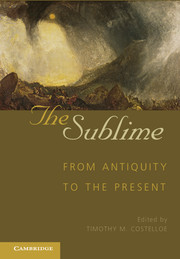Book contents
- Frontmatter
- Contents
- List of Illustrations
- Contributors
- Acknowledgments
- The Sublime
- Part One Philosophical History of the Sublime
- 1 Longinus and the Ancient Sublime
- 2 … And the Beautiful?
- 3 The Moral Source of the Kantian Sublime
- 4 Imagination and Internal Sense
- 5 The Associative Sublime
- 6 The “Prehistory” of the Sublime in Early Modern France
- 7 The German Sublime After Kant
- 8 The Postmodern Sublime
- Part Two Disciplinary and other Perspectives
- 10 The First American Sublime
- 11 The Environmental Sublime
- 12 Religion and the Sublime
- 13 The British Romantic Sublime
- 14 The Sublime and the Fine Arts
- 15 Architecture and the Sublime
- Bibliography
- Index
- References
1 - Longinus and the Ancient Sublime
Published online by Cambridge University Press: 05 January 2015
- Frontmatter
- Contents
- List of Illustrations
- Contributors
- Acknowledgments
- The Sublime
- Part One Philosophical History of the Sublime
- 1 Longinus and the Ancient Sublime
- 2 … And the Beautiful?
- 3 The Moral Source of the Kantian Sublime
- 4 Imagination and Internal Sense
- 5 The Associative Sublime
- 6 The “Prehistory” of the Sublime in Early Modern France
- 7 The German Sublime After Kant
- 8 The Postmodern Sublime
- Part Two Disciplinary and other Perspectives
- 10 The First American Sublime
- 11 The Environmental Sublime
- 12 Religion and the Sublime
- 13 The British Romantic Sublime
- 14 The Sublime and the Fine Arts
- 15 Architecture and the Sublime
- Bibliography
- Index
- References
Summary
INTRODUCTION
Plato’s Timaeus opens with an unexpected absence. The previous day, Socrates had led the discussion; his four companions were due to make their contributions today: “One, two, three … and yet our fourth, my dear Timaeus, is – where? (The fourth) of those who yesterday were guests at the feast, but are now the banquet’s hosts?” (Timaeus 17a1–3). The first clause is a bare enumeration: it could not be simpler in construction, or plainer in diction. The shift from cardinal numbers to ordinal adjective signals a change at the start of the second clause: the diction is less plain, the syntax more elaborate; the displacement of the interrogative, as striking in Greek as in English, enacts Socrates’ surprise. The third clause, with its refined vocabulary and striking metaphor, rises to another level altogether. From a dull beginning, the sentence has blossomed by stages into a display that confers sublimity on the whole.
We owe that analysis to Cassius Longinus, a rhetorician, literary scholar, and philosopher of the third century AD, in a fragment preserved by the fifth-century neo-Platonist Proclus. Proclus’s source was probably a lost commentary by Porphyry, the most distinguished of Longinus’s pupils. Porphyry described Longinus as the greatest critic of the age; he was still renowned in the following century for his scholarship and authoritative literary judgment. It was once taken for granted that this Longinus was the author of the treatise On Sublimity. That attribution came under attack early in the nineteenth century and is now generally discounted. But before we consider this and other philological problems, it may be helpful to begin by undertaking a preliminary survey of what I shall, without prejudice, call Longinus’s conception of the sublime.
- Type
- Chapter
- Information
- The SublimeFrom Antiquity to the Present, pp. 11 - 23Publisher: Cambridge University PressPrint publication year: 2012
References
- 14
- Cited by



